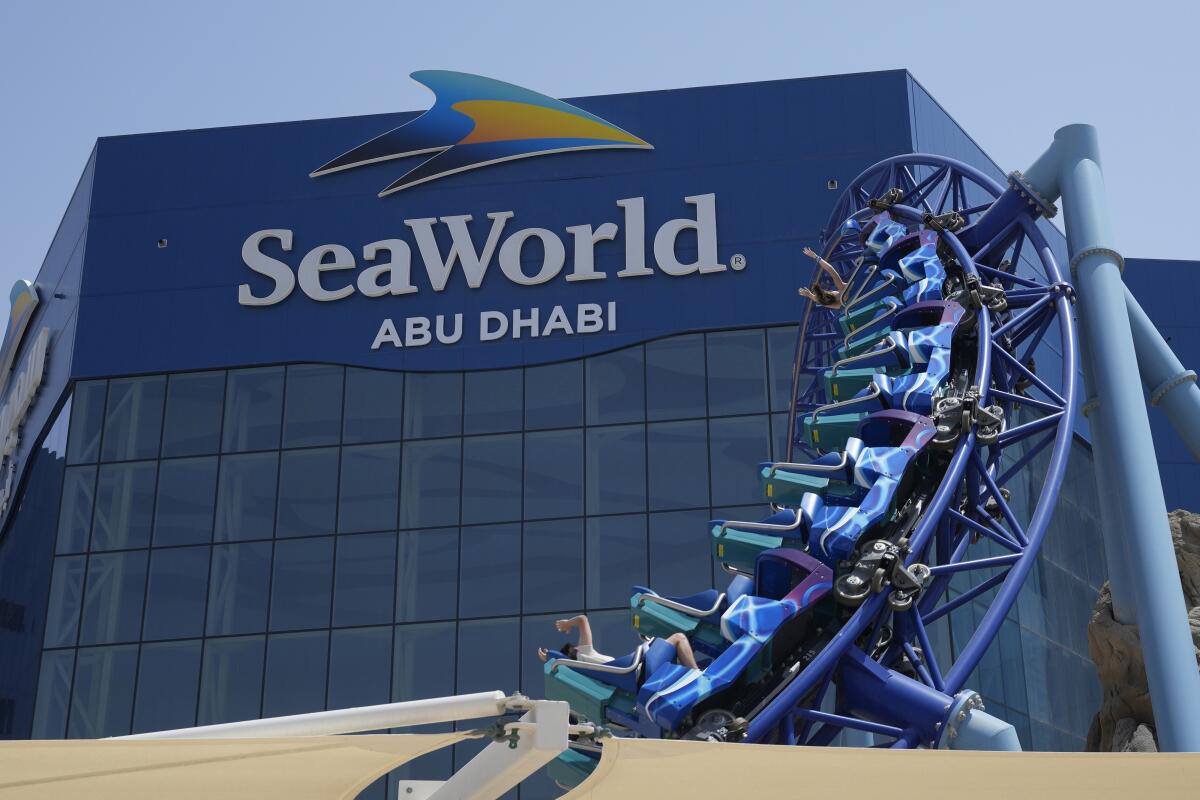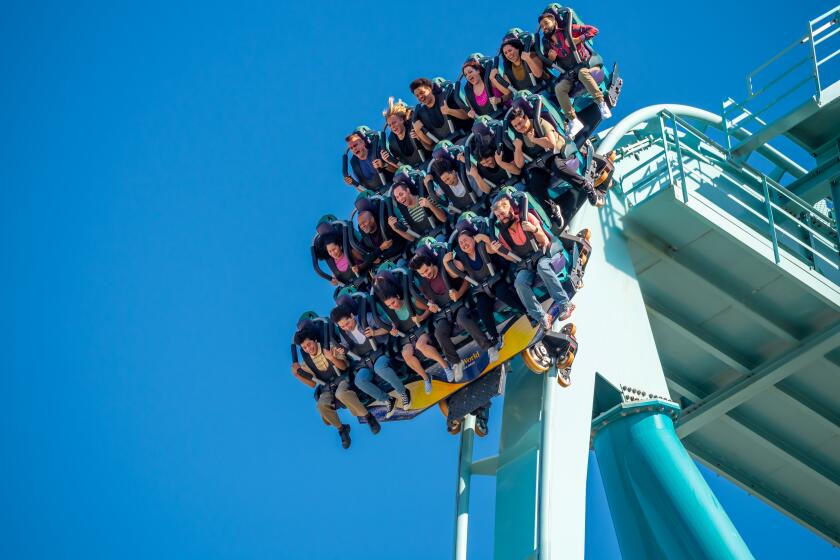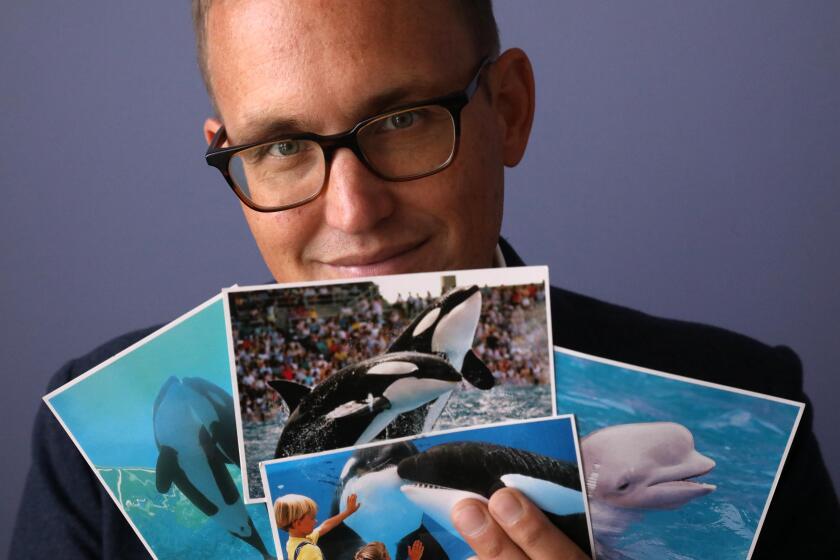A decade after outcry, SeaWorld launches an orca-free park — in the United Arab Emirates

- Share via
ABU DHABI, United Arab Emirates — Theme park chain SeaWorld, mired in controversy in recent years over its treatment of killer whales and other marine mammals, has opened a massive new aquatic life park in the United Arab Emirates, its first outside the U.S. and one that has no orcas.
The $1.2-billion venture with state-owned developer Miral features the world’s largest aquarium and a cylindrical LED screen. Although there are no orcas, the park houses animals such as dolphins and seals, whose captivity and training for profit and entertainment purposes are also often criticized as unethical by animal rights groups.
The new facility, which opened to visitors last month, gives the Orlando, Fla.-based company a foothold in a fast-growing international tourism destination and the opportunity to continue its rebranding after years of criticism and allegations of animal cruelty.
SeaWorld and Miral declined multiple interview requests from the Associated Press. They also did not answer written questions or grant AP journalists access to the park.
Scrutiny of SeaWorld intensified following the release of the 2013 documentary “Blackfish.” The documentary focused on the life of Tilikum, a 12,000-pound orca that killed trainer Dawn Brancheau when he dragged her into a pool at SeaWorld Orlando in 2010. The film implied that orcas become more aggressive in captivity.
The film caused visitor numbers to plummet across SeaWorld’s three parks in the United States — in Orlando, San Diego and San Antonio. SeaWorld Entertainment later agreed to pay $65 million to settle a lawsuit in which it was accused of misleading investors over the impact the documentary was having on its bottom line.
“SeaWorld’s greed and arrogance are offensive, and the city will hold it accountable,” City Atty. Mara Elliott said of the planned litigation.
In the face of mounting criticism, SeaWorld halted its orca breeding program and live performances featuring the whales in 2016. That same year, it announced plans to build a park without orcas in Abu Dhabi in the UAE.
The company’s promotional materials say that it is committed to rescuing and rehabilitating animals and that a full-time staff of veterinarians ensures that they are well-cared for. Last year, its Orlando theme park opened a facility to care for Florida manatees that were dying from starvation in their natural habitat. The company says it has raised $17 million to support hundreds of research and conservation projects around the globe.
“By leveraging a fundamental SeaWorld design principle of putting animal well-being and care at the core of the design, SeaWorld Abu Dhabi is set to redefine the standards of excellence for marine life theme parks across the world,” the company’s chairman, Scott Ross, said in a statement.
The park is certified by the international brand of American Humane, which is behind the end-credit certifications in films that say no animals were harmed during production. The Assn. of Zoos and Aquariums, widely seen as the gold standard for humane certifications, has certified SeaWorld’s U.S. facilities, but the Abu Dhabi park has not submitted an application for accreditation, according to Jennifer DiNenna, director of accreditation at the association.
SeaWorld Entertainment has made an unsolicited offer to purchase longtime theme park company Cedar Fair, which owns a dozen amusement parks, including Knott’s Berry Farm in Orange County.
Steps taken since the “Blackfish” controversy have yet to silence some of SeaWorld’s critics.
“SeaWorld is part of an industry built on the suffering of intelligent, social beings who are denied everything that’s natural and important to them,” said Jason Baker, senior vice president of international campaigns at People for the Ethical Treatment of Animals, or PETA.
“In nature, dolphins live in large, complex social groups and swim vast distances every day. In captivity, they can only swim in endless circles inside tanks that, to them, are the equivalent of bathtubs.”
During a scheduled inspection of SeaWorld Orlando in December, the U.S. Department of Agriculture cited the company for animal welfare violations after discovering a dolphin “actively bleeding” from “many deep rake marks,” and excessive chlorine levels in the dolphin tanks.
Ten years after a legal activist filed a lawsuit for orcas held in captivity, he began receiving postcards from them.
There have been no reports of abuse at the newly opened Abu Dhabi park, which did not answer questions about its treatment of dolphins.
For the United Arab Emirates, home to the futuristic city of Dubai, the world’s tallest skyscraper and the Louvre Abu Dhabi, the arrival of SeaWorld adds yet another major tourist attraction.
The partnership with Miral brings SeaWorld into a larger plan to transform Abu Dhabi’s Yas Island into a theme park hub to rival Orlando. The island already boasts a Formula 1 circuit, a water park and a Warner Bros. theme park, and celebrities such as Kevin Hart and Jason Momoa have been enlisted to promote it.
SeaWorld pays homage to Abu Dhabi’s cultural heritage with a themed “realm” of traditional houses and sailboats evoking a simpler time before the discovery of oil, when the sparsely populated emirates largely relied on fishing and pearl-diving.
An in-house research facility will study aquatic life in the Persian Gulf and support the conservation of local species, including the manatee-like endangered dugong.
More to Read
Sign up for Essential California
The most important California stories and recommendations in your inbox every morning.
You may occasionally receive promotional content from the Los Angeles Times.












